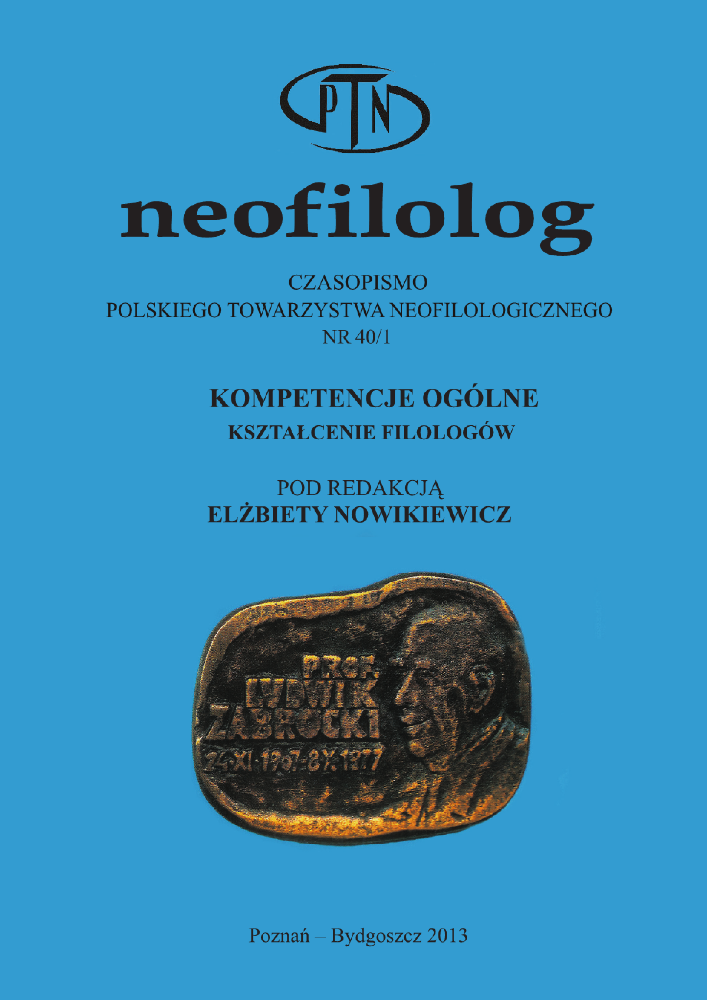Abstract
The paper focuses on the development of the listening comprehension of advanced students of French as a foreign language and concerns current affairs radio programs. It presents the main conclusions discussed with reference to one of the problems researched within a larger academic project conducted from 2010 to 2013. The aim of the paper is to determine some essential principles that should guide the development of questions in the pre-listening stage so that, during the subsequent while-listening stage, they could foster the individual comprehension process. The conclusions emphasize the relationship between the form and function of these pre-listening stage questions and the quality of cognitive and communicative actions performed by the listeners.References
Berne, J. E. 2004. « Listening Comprehension Strategies: A Review of the Literature ». Foreign Language Annals 37 (4): 521-531.
Bronckart, J.-P. 1996. « L’acquisition des discours. Le point de vue de l’interactionnisme socio-discursif ». Le Français dans le Monde. Le discours : enjeux et perspectives. no spécial: 55-64.
Charaudeau, P. 2005. « Sémantique de la langue, sémantique du discours » (w) Actes du colloque en hommage à Bernard Pottier. http://www.patrick-charaudeau.com/Semantique-de-la-langue-semantique.html. DW 14.052013.
Coste, D., North, B., Sheil, J. i Trim, J. 2003. Europejski system opisu kształcenia językowego: uczenie się, nauczanie, ocenianie. Warszawa: CODN.
Coubard, E. 2003. « Habitudes culturelles d’apprentissage en activité de compréhension orale ». Etudes de linguistique appliquée 132 (4): 445-455.
Dolz, J. i Schneuwly, B. 1998. Pour un enseignement de l’oral: initiation aux genres formels de l’oral. Paris: ESF Editeur.
Górecka, J., Wilczyńska, W. i Wojciechowska, B. (w druku). « Developing second language oral competence through an integrated discursive approach: The conceptual framework of the project and the pilot study results ». (w) Theoretical, empirical and pedagogic perspectives on teaching, learning and assessing speaking skills in a second language (red. M. Pawlak i E. Waniek-Klimczak).
Grzmil-Tylutki H. 2007. Gatunek w świetle francuskiej teorii dyskursu. Kraków: Universitas.
Kamber, A. i C. Skupien. 2008. « Les documents radiophoniques dans l’enseignement de la comprehension orale ». Mélanges CRAPEL 31: 173-189.
Leaver, B. L. i B. Shekhtman (ed.) 2002. Developing Professional-Level Language Proficiency. Cambridge: CUP.
Poussard, C. 2003. « Guider des stratégies de compréhension de l’oral en ALAO: le cas de l’inférence ». Apprentissage des langues et systèmes d’information et de communication. 6 (1): 143-150. <http://alsic.revues.org/2132?lang=en> DW 30.10.2012.
Strzemeski, K. 2011. « Autonomizacja studentów poprzez ich samodzielną pracę z podcastami-plikami audio » (w) Autonomia w nauce języka obcego – uczeń a nauczyciel, (red. M. Pawlak). Poznań-Kalisz-Poznań: Wyd. UAM: 327-336.
Vandergrift, L. i Tafaghodtari, M. H. 2010. « Teaching L2 Learners How to Listen Does Make a Difference: An Empirical Study ». Language Learning 60 (2): 470-497.
Vandergrift, L., Goh C.C.M., Mareschal C. J. i Tafaghodtari, M. H. 2006. « The Meta-cognitive Awareness Listening Questionnaire: Development and Validation ». Language Learning 56 (3): 431-462.
Wilczyńska, W. i Wojciechowska, B. (w druku). « Świadomość gatunku dyskusja a rozumienie obcojęzycznych audycji radiowych ».
Wilczyńska, W. i Wojciechowska, B. (w druku). « Procédés interactifs de construction du sens dans l’émission Le téléphone sonne. Un modèle dans le développement des compétences orales élevées en L2 ». (w) Des organisations dynamiques de la langue orale (red. E. Richard i inni). Peter Lang.
Zaśko-Zielińska, M. 2002. Przez okno świadomości. Gatunki mowy w świadomości użytkowników języka. Wrocław: Wydawnictwo Uniwersytetu Wrocławskiego.
License
Copyright (c) 2019 Neofilolog

This work is licensed under a Creative Commons Attribution-NoDerivatives 4.0 International License.
Authors
Authors of texts accepted for publication in Neofilolog are required to complete, sign and return to the Editorial team’s office the Agreement for granting a royalty-free license to works with a commitment to grant a CC sub-license.
Under the agreement, the authors of the texts published in Neofilolog grant Adam Mickiewicz University in Poznań a non-exclusive, royalty-free license and authorize the use of Attribution-NoDerivatives 4.0 International (CC BY-ND 4.0) Creative Commons sub-license.
The authors retain the right to the free disposal of the work.
Users
Interested Internet users are entitled to use works that have been published in Neofilolog since 2017, under the following conditions:
▪ attribution – obligation to provide, together with the distributed work, information about the authorship, title, source (link to the original work, DOI) and the license itself.
▪ no derivatives – the work must be preserved in its original form. Without the author's consent, it is not possible to distribute the modified work in the form of translations, publications, etc.
Copyrights are reserved for all texts published since 2017.
Miscellaneous
Adam Mickiewicz University in Poznań retains the property right as a whole (layout, graphic form, title, cover design, logo etc.).
